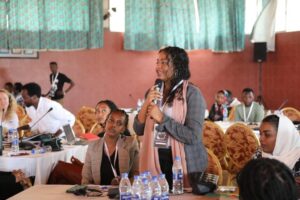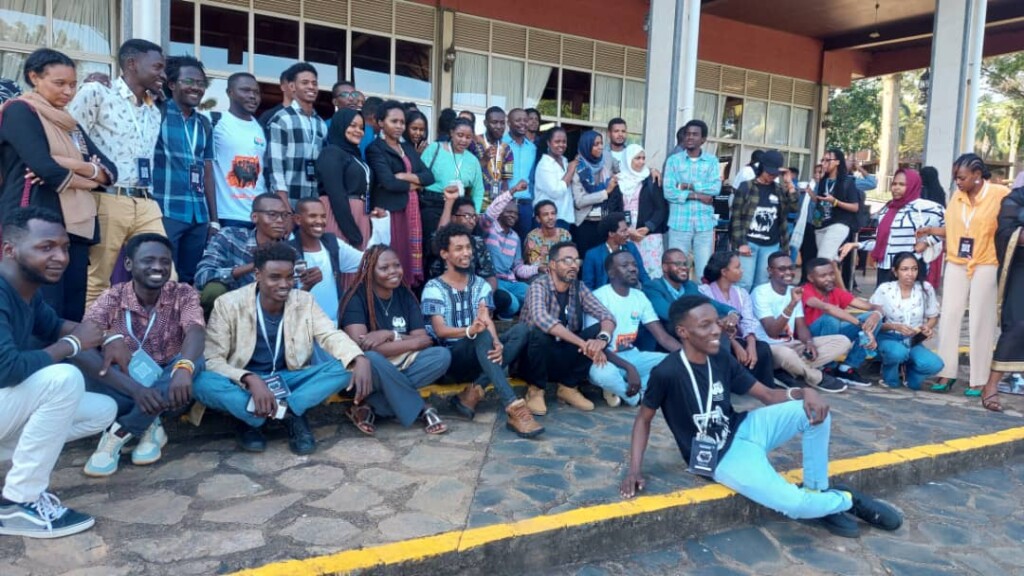ENTEBBE, MARCH 22, 2024 (CISA) – Over 160 Sudanese youth from Sudan, South Sudan, Uganda, Kenya, Ethiopia, Chad and Egypt convened in Entebbe, Uganda, for a four-day conference in March to chart paths and discuss ways to bring to an end the ongoing conflict in their country.
Under the umbrella body of the Sudanese Youth Network for Ending War and Establishing Democratic Civil Transformation (SYN), the youth committed to addressing the country’s challenges and reflected on their shared concerns about the heightened insecurity and humanitarian situation in Sudan.
The illuminating conference outlined a series of recommendations aimed at supporting efforts to end the ongoing conflict in the country, provide humanitarian aid to affected regions, advocate for youth involvement in civil political processes, and set the path to democratic transitional justice.
“There will be practical steps to form youth networks in countries where there is a diaspora presence, as well as in Sudan, after which we will begin to implement the conference’s outcomes. The network will engage, in the first step, with all the actors at home and abroad who are working to stop the war in Sudan” said Mohamed El Doum, a member of SYN.
El Doum emphasized that the focus of the network will be to onboard the internal actors in Sudan before broadening the sphere to the diaspora networks. He highlighted that the push to look for an external solution to the challenges in the country has always “ignored internal voices,” thus, hindering the peace process.

“We will also engage with humanitarian actors and youth in areas such as Jebel Marra, South Kordofan, and eastern Sudan which are controlled by armed movements, to involve them in our efforts to stop the war,” he noted.
In an interview with Radio Dabanga of Sudan, El Doum revealed that the network will also engage the warring parties: the Sudanese Armed Forces (SAF) and the Rapid Support Forces (RSF), warning that “the longer the war lasts, the more likely that other parties will emerge, and finding a solution becomes more complicated.”
Mohanad Oraby, a member of SYN, underscored the significance of youth inclusion in the constitutional and political processes that aim at bringing about a democratic civil transition and justice in Sudan.
“It is important for the network to move towards implementing these outcomes by adopting means, such as organizing popular campaigns, to convey the voice of youth against those who started the war, and those who wish for it to continue,” said Oraby, noting that “We are ready to sit with the commanders of the army and the RSF, let us put before them the youth agenda, and pressure them through existing networks at home and across regional and international levels.”
Mohieldin Omar, an advisor to the United States ambassador to Sudan, firmly supported the initiative by the youth, noting that “any political initiative excluding the youth would lack legitimacy and not receive support from the United States.”
He reaffirmed the commitment of the United States to supporting peace initiatives, reinstating democratic civil governance in Sudan, and facilitating the distribution of humanitarian aid. Omar highlighted the recent appointment of US Special Envoy for Sudan, Tom Perriello, as evidence of this commitment, adding that the envoy “will soon go on a regional tour to advance peace efforts in Sudan.
In an online special briefing with Tom Perriello discussing urgent US efforts for peace and an immediate end to the war and humanitarian crisis in Sudan on March 21, the US Special Envoy for Sudan said “We have been visiting with Sudanese across Uganda, Ethiopia, Kenya, Djibouti, and Egypt, as well as meeting with our African counterparts and now visiting with our counterparts in Saudi Arabia and finally the United Arab Emirates. And the Sudanese people could not be more unified and clear. They want an end to this war now. They want full humanitarian access. And they want their future back. And it is our job, all of us who care about the people of Sudan – around the world, around this neighbourhood and beyond – to be urgently seized with the project of ending this war, preventing the worst of this famine, and giving the Sudanese people a chance to determine their own future.”

